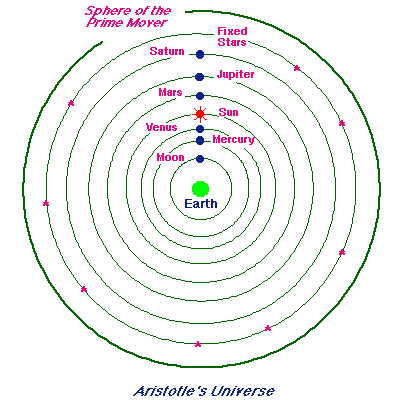What did Ptolemy and Aristotle both think about the planets' orbital path?
1 Answer
They thought the Earth was the centre of the Universe and everything revolved around it and that those orbits were circular.
Explanation:
Sometimes great thinkers just get it wrong.
So let's talk about Aristotle. As he thought about the heavens and creation and divinity, he reasoned:
- that the Earth was the centre of the universe. Not only was there ample evidence of things going around the Earth (Sun, stars, planets, etc), but he reasoned that the wind that would be generated from the Earth moving would be such that everything and everyone would be blown off the surface. So everything must move around the Earth,
- that with the abundance of circles everywhere (the horizon is a circle, the sky is a circle, the Sun and Moon are circles), that the paths that all the stuff that is moving around the Earth is following must be a circle, and
- the brightness of astronomical objects didn't change.
He proposed that everything revolving around the Earth was on a crystalline sphere (there were 55 in total) and as those spheres moved, it generated a music so sublime that only Divine Entities could hear it - he called it the Music of the Spheres.

There were some problems with his idea that presented right away - for instance, planets can go retrograde (which is when a planet appears to be moving backwards against the sky backdrop) - Aristotle's theory didn't allow for that type of motion.
And so he changed his model to account for this, by adding more circular pathways that the planets followed.
And yet there were still problems between observations and theory.
Ptolemy then took up the challenge and had circles within circles and other circles and and and...
Aristotle lived from 384-322 BC and Ptolemy from 90-168 AD. Their vision of the nature of the heavens expanded far and wide (primarily due to Aristotle being Alexander the Great's tutor, so as Hellenic thought spread throughout the world, so too did Aristotle's ideas).
So widely did these ideas pervade that the Christian Church picked up on them, substituted their own words (ex. the Sphere of the Prime Mover - originally the source of angular movement for all the spheres below it, became "God"), and suddenly this world view was also orthodox religious thought.
It wasn't until the Renaissance, when Nicholas Copernicus (1473-1543) realized that the Earth wasn't at the centre of the Universe, that the beliefs of Aristotle and Ptolemy were successfully challenged. Johannes Kepler (1571-1630) realized the orbits were ellipses and not circles. He also described how brightness would change with distance.
http://csep10.phys.utk.edu/astr161/lect/retrograde/aristotle.html
https://en.wikipedia.org/wiki/Johannes_Kepler
https://en.wikipedia.org/wiki/Nicolaus_Copernicus

